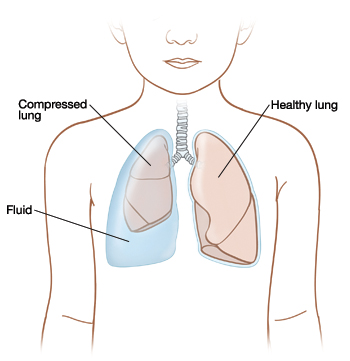When Your Child Has Pleural Effusion
When Your Child Has Pleural Effusion
The area between the chest wall and lung is called the pleural space. The lining around this space produces small amounts of fluid. This fluid helps lubricate the lining and allows the lungs to expand smoothly. Pleural effusion occurs when too much fluid builds up in the pleural space.
What causes pleural effusion?
Pleural effusion can occur if your child has a lung inflammation or bacterial infection. It can also happen if fluid builds up after a surgery. If not treated, pleural effusion can lead to serious breathing problems. That’s why your child needs treatment right away.
What are the symptoms of pleural effusion?
Pleural effusion may not cause symptoms. If symptoms occur, they can include:
Shortness of breath or rapid breathing
Cough
Sharp chest pain that worsens with coughing or deep breaths
Fever of 100.4°F (38.0°C) or higher
How is pleural effusion diagnosed?
Your child’s doctor listens with a stethoscope and taps on the chest. One or more of the following tests may be done to confirm the diagnosis:
Chest X-rays in different positions to check whether air or fluid is in the pleural space
Ultrasound or CT scan if chest X-ray does not give a clear picture. These tests may give a better picture of location and pockets of fluid in the pleural space
Pleural fluid analysis, which involves inserting a needle into the pleural space to remove fluid and then sending it to a lab for testing
How is pleural effusion treated?
Treatment depends on how much fluid is present and whether or not it is infected.
If there is a small amount of fluid, it will likely go away on its own. Your doctor will have you watch your child at home. No hospital stay is needed.
If your child has a lot of fluid or pus, is having trouble breathing, or is uncomfortable, he or she may need to stay in the hospital. A chest tube will likely be placed to drain the fluid.
If an infection is present, antibiotics will be given to treat it.
The doctor will identify and treat any other underlying problem.
What are the long-term concerns?
Often, the causes of pleural effusion in children are less serious than for adults. Your child should have no long-term effects once the underlying problem is treated. The doctor can tell you more about your child’s condition and what to expect.
When to call your child's healthcare provider
Unless advised otherwise by your child’s healthcare provider, call the provider right away if any of these occur:
Your child is of any age and has repeated fevers above 104°F (40°C).
Your child is younger than 2 years of age and a fever of 100.4°F (38°C) continues for more than 1 day.
Your child is 2 years old or older and a fever of 100.4°F (38°C) continues for more than 3 days.
Increasing trouble breathing or rapid breathing
Coughing up blood
Worsening or continued chest pain
Updated:
October 06, 2017
Reviewed By:
Blaivas, Allen J., DO,Dozier, Tennille, RN, BSN, RDMS,Image reviewed by StayWell medical illustration team.
